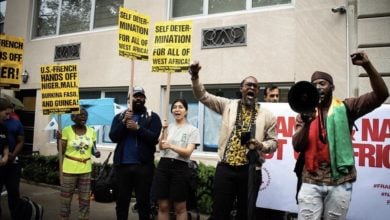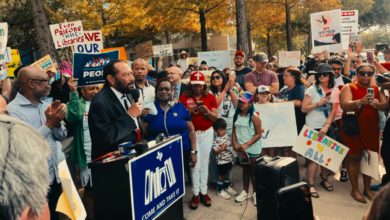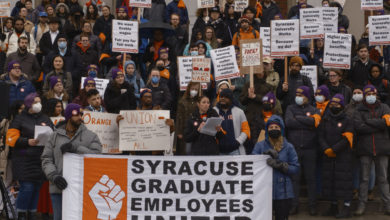Proving that no progressive gain can ever be safe from detractors, the 40-year-old ban on Reserve Officers Training Corps programs at Columbia University has recently been reconsidered. ROTC courses taught at universities are an important tool for recruiting youth into the military.
ROTC was pushed onto the university’s agenda when both Barack Obama and John McCain called for its return at the Public Service Forum held at Columbia University in September. The candidates ignored the military’s disgraceful recruitment tactics targeting minorities and low-income workers, the homophobic “Don’t Ask, Don’t Tell” policy, and the devastation and human rights violations associated with U.S. military action around the globe.
Obama spoke for the need of more student recruitment, especially those from elite institutions. He stated that ROTC at selective schools would help the flagging military and discourage elitism. With ROTC receiving the seal of approval from the man who has come to symbolize change among liberals, student support for the program’s return to Columbia increased dramatically.
The presidential hopefuls shamelessly endorsed turning educational institutions into military recruitment grounds where youth can be enlisted for imperialist war. The candidates sidestepped the fact that, even at Columbia, those more likely to join the military will be the less economically advantaged, lured by illusory promises of career opportunities and money for education.
The liberal anti-ROTC movement on campus did not challenge the U.S. military’s role as an instrument of war and aggression. It barely touched on the implications of allowing an arm of the military to operate within an educational institution with the purpose of furthering pro-imperialist propaganda. Instead, if focused primarily on the “Don’t Ask, Don’t Tell” policy of the U.S. military.
Columbia University President Lee Bollinger sent out a school-wide email explaining that the University Senate voted “overwhelmingly against” allowing ROTC back to campus in 2005 because “Don’t Ask, Don’t Tell” would be “inconsistent with the fundamental values of the University” and its anti-discriminatory policy. Bollinger also described how Columbia students have the ability to partake in ROTC programs at Fordham University and St. John’s College, and receive the full scholarship benefits of these programs.
The pro-ROTC contingent at Columbia argued that allowing the military back onto campus would be an active way to fight discrimination from the inside. Trying to put a progressive spin on their support for a reactionary institution, they argued that those educated in the liberal arts tradition would spread toleration of LGBT enlistees with their very presence. In reality, social change has historically been attained through the struggles of the oppressed, not through the intervention of students from elite universities attempting to elicit tolerance.
As student organizer Johanna Ocaña explained, “The claim that bringing back the ROTC will somehow further progressivism in the military does not make any sense. The strongest stance against the practices of the military is to refuse its influence in any form on campus. The pro-ROTC students did not even consider the ‘economic draft’ currently used by the military, or the unjust Solomon Amendment.”
The Solomon Amendment discontinues federal funding to schools that do not allow a military presence on their campus. Columbia and other Ivy League schools have large endowments to fund their operation, but most universities simply cannot afford to ban ROTC and lose federal money. For that reason, it is critical that schools that can afford to turn down ROTC do so in solidarity with those schools held hostage by the federal government’s financial warfare.
Student activists worked to convince students to vote “no” on allowing ROTC back onto campus in an undergraduate poll, which was supposed to be binding for University Senators in a possible upcoming vote on the issue. The anti-ROTC coalition was able to host the “Voices on ROTC” event that showcased some of the more troubling effects of militarization, tackling socio-economic, gender and sexual orientation issues.
Extensive publicity on both sides and a debate among student panelists culminated in 50.56 percent of the undergraduate student body voting to keep ROTC off campus. While the results were supposed to be transferred proportionally to University Senators, they may not be held to the vote because of issues arising from the electronic voting process. The undergraduate vote was criticized for possibly being open to fraud and not properly distinguishing the votes from each undergraduate college.
The anti-ROTC coalition made considerable gains in the movement, considering that in 2005 the student body had been closer to 60 percent in support of ROTC. One student organizer who preferred to remain anonymous stated: “It was very inspiring to see so many activist groups working together to defend our community values and keep discrimination off our campus. I think our efforts were a big part of why the student body reversed its position from a few years ago and voted against reinstating NROTC. The vote shows what can be accomplished when activists put aside their differences and work towards common goals.”
At this critical juncture, we must not forget the history of this struggle against campus militarization. The 1968 decision to keep ROTC off campus was based on the university’s inability to control the curriculum and hiring process of ROTC officers; it came with a general refusal to be complicit with the military’s goals. Students today need to be reminded that the “Don’t Ask, Don’t Tell” policy is only one of the many manifestations of the egregiously reactionary character of the military. The battle for a campus free from the U.S. military must continue. Gains won through struggle must be defended through struggle.






